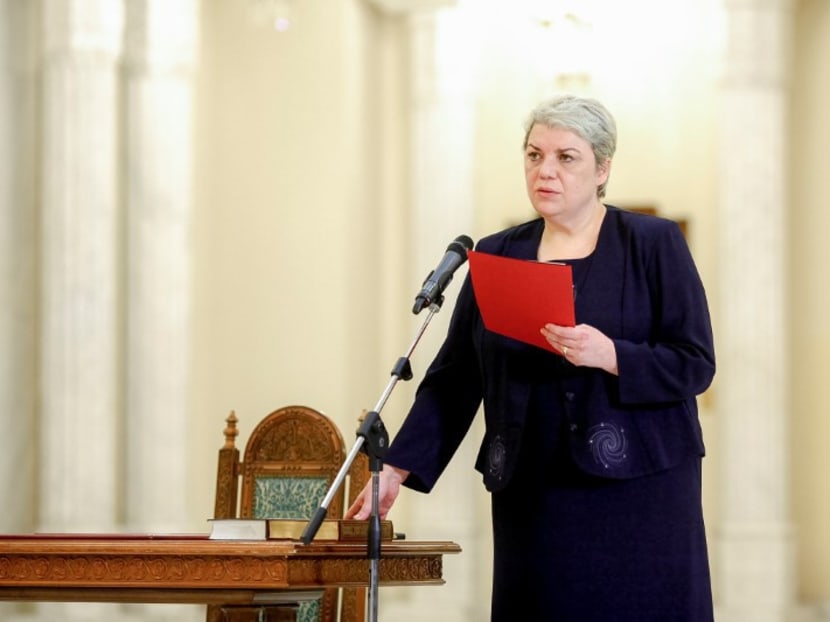Romania’s first female, Muslim prime minister rejected
BUCHAREST — Romania’s president sparked fresh political turmoil Tuesday (Dec 27) after rejecting a proposal by the election-winning leftist party to name the EU country’s first female and first Muslim prime minister.

Sevil Shhaideh is sworn in for the position of minister for regional administration and public administration, in Bucharest, Romania, May 20, 2015. Picture taken May 20, 2015. Photo: Inquam Photos/Ovidiu Micsik/via Reuters
BUCHAREST — Romania’s president sparked fresh political turmoil Tuesday (Dec 27) after rejecting a proposal by the election-winning leftist party to name the EU country’s first female and first Muslim prime minister.
Mr Klaus Iohannis gave no reasons for his rejection of Ms Sevil Shhaideh, put forward by the Social Democrats (PSD), but there was speculation that it may be due to her Syrian husband’s background.
“I have properly analysed the arguments for and against and I have decided not to accept this proposal,” the president told reporters in a televised statement.
“I call on the PSD coalition to make another proposal,” Mr Iohannis said.
The PSD had suggested the previously little-known Shhaideh, 52, after its thumping poll victory on December 11 when it won 45 per cent of the vote.
The leader of the PSD, Liviu Dragnea, had withdrawn his own bid to become prime minister because he is serving a two-year suspended sentence for fraud in a previous election.
Ms Shhaideh’s political experience is limited, having served as development minister for just five months before the previous PSD-led government resigned in late 2015.
This and her personal closeness to Dragnea — he was a witness at her wedding — have stoked opposition accusations that she would merely be his puppet.
Ms Shhaideh is from Romania’s small and long-established Turkish minority, but her Muslim faith is not thought to have been a problem for Mr Iohannis.
Instead the focus may have been on her Syrian husband, whom she married in 2011.
According to non-profit investigative journalism group the Rise Project, he has several times expressed his support for Syrian President Bashar al-Assad and for Lebanese Shiite movement Hezbollah.
The 54-year-old worked in the Syrian agriculture ministry for 20 years before emigrating in 2011, according to media reports and Dragnea. He then served as an advisor to the Romanian agriculture ministry and gained citizenship in 2015.
Former Romanian justice minister Catalin Predoiu, from the centre-right National Liberal Party, said on Facebook that he “can’t see how” the PSD candidate could get the necessary security clearance needed to be prime minister.
Being premier would “give her access to defence information classified as secret, including from NATO,” the Western military alliance that Romania has belonged to since 2004, Mr Predoiu wrote.
“In the absence of any explanations by the president, I suppose that his rejection is linked to questions of national security and because the United States would not have been very keen,” political analyst Andrei Taranu told AFP.
Website HotNews cited unnamed sources as saying that the security services had “strongly cautioned” against Ms Shhaideh’s nomination because of the closeness to the Assad regime of her husband and his two brothers.
WHAT NOW?
All eyes Tuesday were on how the PSD would respond, with some in the party calling for Mr Iohannis to be suspended. Party leader Dragnea was due to make a statement in the afternoon.
“Either the PSD shows its wisdom by making a new proposal (for prime minister) or we move towards fresh elections,” Mr Taranu said.
But he added that an attempt by the PSD to remove the president was problematic because under the constitution Iohannis is entitled to request a second proposal for premier.
The PSD’s election triumph came barely a year since anger over a deadly nightclub fire that killed 64 people forced it and prime minister Victor Ponta from office.
The inferno inside the Colectiv club was blamed on corrupt officials turning a blind eye to a lack of fire precautions. Poor medical care exacerbated the death toll. AFP






